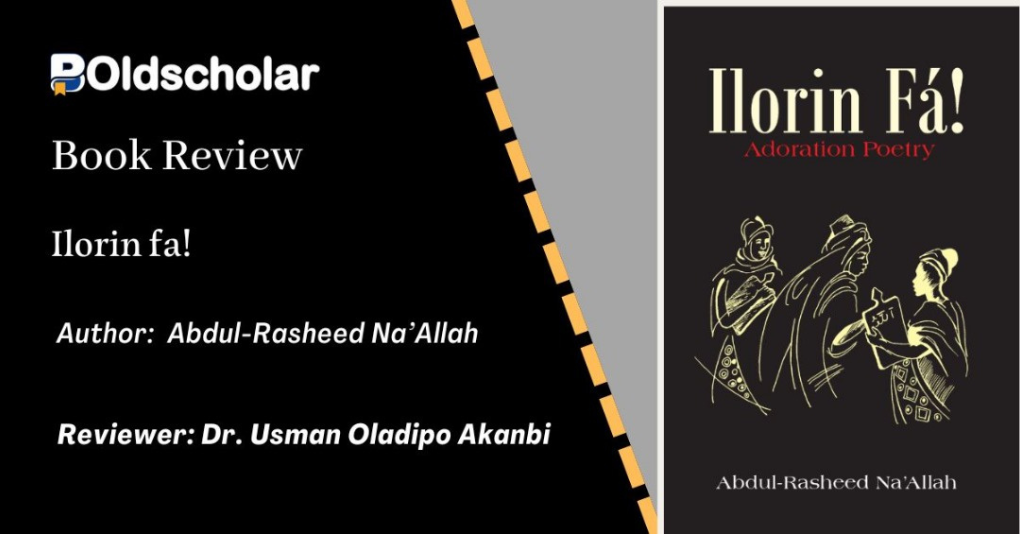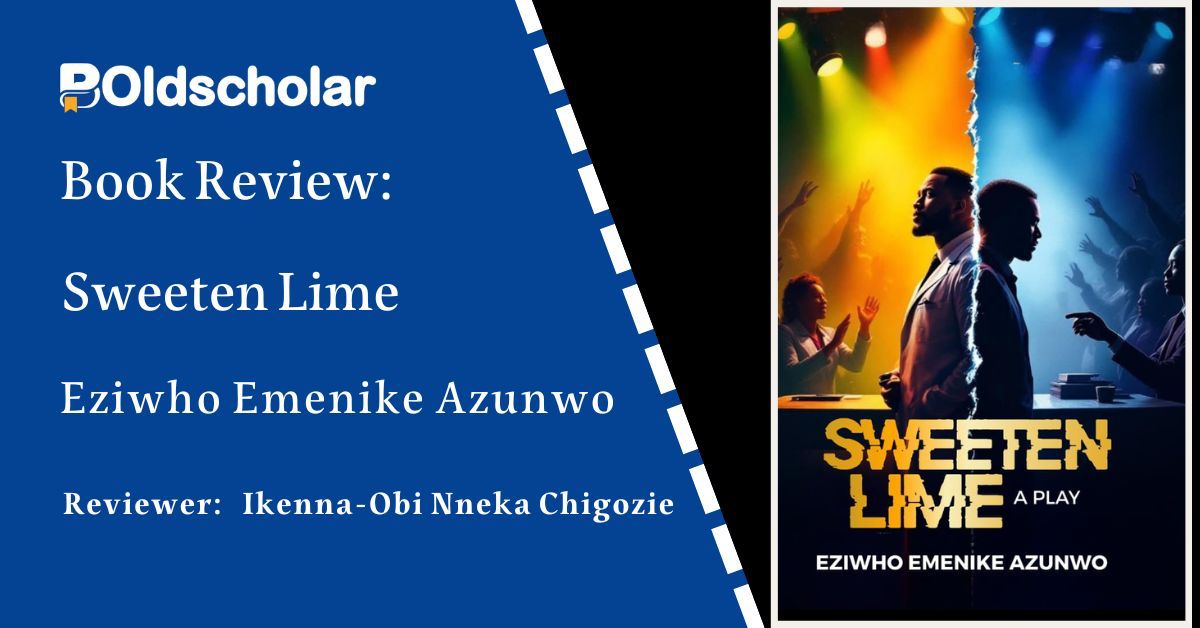A Rich Tapestry of Culture and Language: A Review of Ilorin Fa! Adoration Poetry
Book: Ilorin fa!
Author: Prof. Abdul-Rasheed Na’Allah
Reviewer: Usman Oladipo Akanbi
Publisher: BOOKCRAFT AFRICA
Year of Publication: 2022
Pages: 95
Introduction
Professor Abdul-Rasheed Na’Allah, the poet, is not only a talented writer but also a mentor, friend and guiding light who has inspired so many of us over the years. I have had the privilege of knowing Professor Abdul-Rasheed Na’Allah for over three decades, and his impact on my life has been profound. Our very first encounter dates back to year 1990, when I was elected President of the Ilorin Emirate Student Union at the University of Ilorin, and he graciously accepted my invitation to be a guest speaker at our Ilorin Emirate week. His impactful lecture left a lasting impression on me, and I was struck by his passion for knowledge and his ability to inspire others. When I was elected as the President of the University of Ilorin Students' Union in 1991, he was extremely supportive of me.
Years later, Professor Na’Allah wrote a beautiful foreword to my first collection of poems, Weevils on Grains, igniting my passion for literary arts even further. Our paths crossed again in 2014, when he offered me an adjunct lecturer position at Kwara State University, and later supported my bid for the presidency of the Association of Nigerian Authors. His support and encouragement meant the world to me, and I am quite grateful for his presence in my life.
I feel humbled and honoured to have been considered worthy of reviewing this culturally-inspired masterpiece by an erudite scholar, Prof. Na’Allah. His selection of me for this task not only indicates his confidence in me but also affirms that I have been schooled well enough in the art of literature, despite my primary academic background in the sciences.
Reluctantly, I accepted the role of reviewing literary works, despite initial reservations. However, when the requests started pouring in, I relented, largely because others had done the same for me by reviewing my own works too. This meant I had to learn the art slowly and painfully. Now, I'm reviewing a poetry collection for only the second time, whereas I've had more experience with prose. My initial thought was, "How do I even begin?" given that a single poem can have multiple interpretations spanning several pages. Nevertheless, I must be mindful of the review's length to avoid writing a book about this concise collection of poems.
Organisation
It's heartwarming to discover a poetry book that sparks nostalgic feelings about one's heritage and culture. "Ilorin fa! adoration poetry" is a captivating collection, divided into seven parts, that beautifully captures the essence of Ilorin city. As a melting pot of diverse cultural influences, Ilorin's rich history is shaped by the convergence of various ethnic groups, including the Yorubas, Fulanis, Hausas, Boko-Barubas, Nupes, Gobirs, Kanuris, Kemberis and the Gwaris. The Yorubas themselves comprise descendants of sub-ethnic groups like the Oyos, Ijeshas, Igbominas, Ibolos and others. Once an outpost of the ancient Oyo Empire, Ilorin's cultural heritage is a vibrant blend of Islamic and traditional influences, shaped by the Fulani leadership that followed.
I must mention the name Ilorin came about from an iron-grinding stone located in Bamidele compound of Ilorin. Incidentally, the Senator representing Ilorin Senatorial district, Senator Saliu Mustapha hails from this compound.
In the first part, "Ololufemi, Ilorin ni, 'My love, my Ilorin'," the poet expresses his deep affection for Ilorin, its people and cultural heritage, much like a typical Ilorin indigene.
Using the Yoruba language, the author romanticises Ilorin, its people and culture, emphasizing the city's reliance on Allah rather than minor deities. He draws on local folklore stories and songs to vividly portray the characteristics that define Ilorin, including its charming allure, crafts and approach to life. Ultimately, the poet describes the people of Ilorin as metahumans, possessing solutions to the pressing issues that commonly confront individuals in our society. The writer continues to celebrate Ilorin in the poem on page 3 -
‘Ilorin, the satisfaction of man, wherever in the world he is/ Ilorin, the happiness of woman, whatever in the world she possesses…whoever knows what Ilorinnians feel about their city can understand why/they hardly like to live anywhere else.’
The poet likened the constituent groups that formed Ilorin, coming together to ply their trade, karakata, in unity and harmony to Ero Oja -Market crowd. In “Ero Oja seetide” – he asserts that diverse people unite and thrive in a spirit of cooperation and mutual support –
oja ninje Ilorin, alubarika ninje Ilorin, owo ninje Ilorin/asepo aafa, asepo omokewu, asepo awon obirin, asepo awon okunrin, asepo samonri, asepo agbalagba, Ilorin fa! (pg5)
The author accentuates virtually every aspect in the first part of the poetry collection with some beautiful words of wits and wisdom that celebrates Ilorin, which he aptly described as a city of peace and harmony.
In part two of the collection, ‘Life of them, Adorers’, the writer celebrates a few prominent individuals that epitomise the current generation. The first on the list is the remarkable 10th Emir of Ilorin, Aliyu Baba Agba, Dogo Onisuru, who attained the position of his forebears after a long-patient wait. The writer harped on three notable virtues the emir possessed – resilience, patience and contentment –
‘They chose Dogo, and stood by the choice, and un-chose Dogo, and stood firmly in dropping him/Ilorin knew what it loved, and it was loved by Dogo Oni Suru/Aliyu AbdulKadir became Baba-Agba from his patience of his first un-choosing/Whosoever lacks self, lacks greed, in giving the self to others, became the ruler!’ (pg16)
The author also highlights the close-family ties between the houses of Sulu-Gambari and Abdulkadir, which have been strengthened through intermarriage. Additionally, he also expressed his deep-fraternal relationship with the accomplished journalist, Modibbo Kawu, whose exceptional abilities he likened to a lion that needs no introduction. This phrase echoes Nobel laureate Wole Soyinka's words, "The Tiger does not proclaim its tigritude." In a poem honouring Modibbo, the writer praises his versatility as a scion of the esteemed Kawu family, renowned for their vast knowledge in both Western and Islamic scholarship. Perhaps, the author momentarily forgets to use Ishaq instead of Lanre, but the poet may have been deliberate in his preference for the use of Lanre as that name is synonymous, in the Yoruba language, with wealth in all its ramifications.
Another Lanre revered by the writer is a distinguished engineer and leading light of Ilorin, recognized globally for his engineering prowess. Engineer Lanre Sagaya is not only a skilled businessman but also a dedicated philanthropist, earning him the esteemed traditional title of Zana of Ilorin, meaning "custodian of heritage wealth in Ilorin," from the Emir of Ilorin. Notably, the Sagaya family has a long history of thriving in commerce.
The poet also highlights three prominent individuals who have made a significant impact on Ilorin - Prof. Oba AbdulRaheem, affectionately known as Oba Abu, who made history as the first Ilorin-born Vice Chancellor of the prestigious University of Ilorin, an institution renowned not only in Nigeria but across the entire black Africa continent. The second individual mentioned is the late Dr. Abubakar Olusola Saraki, a political icon who dominated Ilorin's political landscape for nearly four decades, and whose influence continues to be felt through his children, including Dr. Bukola Saraki, a former Governor of Kwara state and former Senate President of the Nigeria National Assembly, and Senator Gbemisola Saraki, a former Minister of the Federal Republic of Nigeria. Finally, in section two, the writer dedicates an adoration poem to the late Alhaji S.K. Dan Alhaji of Alkinla compound, Ilorin, whose wealth and legacy are legendary, as described in the poem written in his honour.
Part three, titled 'Conceptuality,' brings the author's poetry closer to home, making it more relatable and accessible to the average Ilorin resident. In the piece titled 'Isale Ajasa,' the author skillfully employs his native Ilorinised-Yoruba dialect to explore the interconnectedness of families, neighborhoods and gathering places (assemblies) where ordinary folks in Ilorin come together to work, socialise and practice their crafts. In 'Obaalorin,' the author again uses his native Yoruba to praise the virtues of the Emirs of Ilorin and their chieftains, including clerics, highlighting their role in using religion to promote social harmony. What sets the Emirs of Ilorin apart is their reliance on Islamic faith to govern the city, unlike other Obas who may use different means. The author notes that the title 'Kabiyesi' is not used in Ilorin, as it is believed that only Allah, the one true God, deserves such a reverent title.
In 'Omo-Iya,' the author emphasized the bond of unity prevalent among Ilorin folks as akin to that which betwixt beloved brethren –
'Personal love,' he says, 'is the love of self! / and love of self, panacea for love of others! / Go to Ibrahim Gambari, the Emir's offspring, to learn his theory! / Love yourself to love others, theory of the Emir!' (pg38)
This short excerpt of the poem is a summary of what the poem portrays. He used 'Iya Alasalatu' to bring to the fore the activities of the various women Islamic prayer groups that dot the Ilorin landscape, whose activities he mentioned as far removed from those of the 'iseese' groups that operate elsewhere. Worthy of mention by him in this regard is the popular Rukayyatu Baatimoluwasi Aya Suleimana. Quoting Al-Amin M. E., 2024:
“Waka chant in Ilorin is deeply influenced by Islamic culture, serving as a notable example of the intersection between music, gender, and religion (Euba, 1977). A variant of Waka music was developed from Yoruba folklore. This version of Waka music gained popularity in the 1950s through artists like Batuli Alake, and its origins can be traced to Seli, a form of singing in traditional Ijebu society, where women sang as part of ceremonial processions. There is also the notion of Waka with connections to women groups with Islamic leanings, such as the ‘Egbe Alasalatu’, who focused on oral performances that propagate Islamic teachings.
Ilorin Waka, originating from Ilorin, Nigeria, combines traditional Yoruba music with Islamic influences, featuring female vocalists such as Alhaja Rukayat Batimoluwasi, a notable figure. The performative nature of the variant of the Ilorin Waka has been categorised by Na’Allah (2014), to three different classes identified as the group Waka chanters, one-man Waka chanter and the housewives Waka chanters.”
Somewhere in the collection, the poet also venerates distinguished clerics like the late Alhaji Kamaludeen, Alfa Adama, Ajongolo, and Kokewukobere and others who have made significant contributions to the city of Ilorin.
The author expresses concern about the rising tide of criminality among the youth in recent times, which has spread rapidly across the Ilorin Emirate. If left unchecked, this trend could spell disaster for an otherwise decent environment. He attributes this decline in part to digital technology, which has become a double-edged sword. In the poem "Danger, Deep Fakes, for Ilorin?", the author sounds the alarm bell, warning of the emergence of a new crop of youth he calls "bastards of society." He begins with a lamentation,
"The poet cries for sanctity in the face of madness." (pg44)
Using the metaphor of a blind poet holding a lamp, he highlights the absurdity of the situation, saying,
"This lamp is not for me, but for you all without eyes, so you don't step on me!" The poet is exasperated by the actions of these young people, who trivialize human life in their quest to be someone they shouldn't aspire to be. He asks rhetorical questions,
"What shrewdness have Deep fakes, what is the thought behind facelifts, what is the genuineness of doublespeak, what?!" (pg45)
Ajisebi Oyo lan’ri, Oyo ki’se bi enikan - So why live a fake life in the first instance; why pretend to be someone you're not in the first place? Why not just be your authentic self and live a genuine life?
I may be mistaken, but it appears the poet is also addressing individuals in positions of authority who make grandiose promises but fail to deliver even the slightest positive change. They promise the heavens but can't even stir up a speck of dust. They often boast about their superiority over others, but ultimately prove to be worse when appointed to office. These individuals may initiate superficial projects that have little to no real impact on society, leaving citizens feeling disillusioned and unimpressed.
The author also expressed fears that many young people are heading towards a life of crime, which will ultimately lead them to the Mandala correctional centre. In his poem "Mandala," he reveals the true meaning of the word, a Hausa term that connotes peace and tranquility of the mind, soul, and of the body.
“This mandala, everyone seeks as peace of the mind/And as mind of the peace, mind of the heart” (pg42)
This part reminds me of a quote in John Milton’s Paradise lost –
“Where peace and rest cannot dwell/hope never comes that comes to all but torture without end.”
Every indigene of Ilorin long for this peaceful state, which is the essence of Mandala – Ifokanbale in the Yoruba language - a state of harmony and peace that brings calmness to the mind and heart; may God grant this to us!
Every town has its unique blend of local cuisine, and Ilorin is no exception. In part three, the author explores the local food vendors who bring flavour to the town, like Iya Tuwo, Onituwo, Alamala and Eleko gbona. Iya Onituwo stands out, competing with homemakers for their family's attention with her mouth-watering dishes –
“how can you understand the meaning of Iya Tuwo in Ilorin/Only if you perceive the sweetness felt deep inside the brain/ and you understand what it means for a delicious gbegiri to accompany tuwo to the mouth/only if you know how a child feels when he smiles as Iya Tuwo complements with a small ponmo in the soup!” (pg46)
These Iyas, like Iya Tuwo, are scattered throughout the Ilorin Emirate, offering a taste of the town's diverse culinary heritage. Ilorin's unique blend of northern and southern cuisines has evolved over time, making it a must-visit destination for food enthusiasts. So, on your next visit, be sure to stop by one of these local eateries and indulge in the flavours of Ilorin!
In the words of the poet there are also -
“Iya Agbaji, Iya Lele, Iya Popo, Iyan Sarumi, all the Iya are sources of our earth!/Without the Iya Ilorin water will be mere liquid unable to assuage a thirst” (pg48).
Before rounding up part three of the work, the author relishes us with some local folklore oral rendition which devolves on the group call Makondoro. In the piece Makondoro, Ima kodoro, knowledge clarity, the poet unfolds before us the genesis of the group, which took root from the Agabji quarters of Ilorin, and expounding reasons why they act the way they do –
“Makondoro, the traces of Muhammad! If you have not seen the prophet of Islam walk on the street/Have you not seen Makondoro walk, don’t ever ask how the prophet walks” (pg51)
…the beauty of his walk/work is verbally espoused in this popular
Refrain: Makondoro oni Lawani onirungbon loko omoge/ Makondoro oni Lawani onirungbon loko omoge (pg50/51)
The author went further –
“Mokondoro, Knowledge clarity/Recitation are clear like the bell/Voices are delightful like puddings/Proselytization is tasty like the pepper/Tasty and hot, better get water ready for your throat” (pg51)
In part four of the collection, titled Mirage, the poet reflects on the elusive melodies and rhythms of Ilorin. The first piece, "Ahunpena," explores the concept of aiye and aleba, chasing after worldly things that are fleeting and leave only shadows behind. Despite life's vicissitudes, Ilorin's nature remains peaceful and harmonious.
In "Leafs and Leaflets," the poet asks about people searching for something they don't understand, and concludes that one must discover Ilorin's leaflet to know the source of water in a coconut, echoing Evangelist Ebenezer Obey who sang Ona to’mi ba wo’nu agbon koleyewon rara….
In "Blue or Yellow" the poet celebrates Ilorin's plurality, a melting pot of cultures coming together to become one colour, exhibited in the town's joint founders, that earned the town the cognomen: Ilorin Afonja-Garin Alimi!
While in "Close Net of Bees" he likens the interconnectivity of bees in a hive to the close-knit relationships between Ilorin households, resulting from intermarriages over the years.
The poet also highlights the influential families of Sarakis and Abdulrazaks, who have dominated Ilorin's modern history. In "In the world of Abdulrazak," dedicated to Governor AbdulRahman AbdulRazak, the poet extols his virtues and acknowledges the House of Sheik Alimi as the foundation for the achievements of all great men and women in Ilorin.
In part five, the poet dedicated the piece Oke Ebo Alaso, the western cloth weavers of Ilorin who merged with the local entrepreneurs to build a then-thriving business, but wonders what happened in the long run to the enterprise. He consoles himself with the saying -
Enia laso mi... (pg65)
If there be no cloth, then let the people around still find ways of clothing themselves with love for one another, surmised in a single phrase –
“Ilorin's sought-for humanity!” (pg65)
In the piece 'Omolangidi', the poet reminds me of the common Ilorin saying, first related to me by my late father, woni kokewu, o'kewu, woni o'kawe, o'kawe, won wa pe alaru, odake – they implored you to learn Islamic knowledge, you bluntly refused, they implored you to pursue western education, you flatly refused, they called out for a load carrier, you keep mute! In 'Omolangidi', the poet talks of omo alali, omo girki, omoluabi, omo iyi, omo alaponle as against omo lasanlasan, omo adanu. Omo tio ni hankali… the poet took time to once again shower praise on Ilorin – Omo akewu sola, afi walaa tore / Omo Ilorin Afonja da kaya / omo Ilorin afonja da loko / omo Ilorin afonja de lailaha illla llahu!, But this part reminds me of the Hausa language version that I was familiar with - Ilorin Ashiga da Kaya, afita da loko, afita da lailaha illla llahu! - Ilorin, where peace resides, a resting place where Allah's blessings are abundant, by the grace of Allah.
I should not also fail to remark on another part of 'Omolangidi' that reminds me of Tunji Oyelana's song along the same line – omo toni ebo muti, ohun amekogbona, oni, omi gbona kanna lawonjumu. (pg67) Tunji Oyelana sang – Oyinbo muti, Babami muko, sebi omi'gbona ni gbogbo wa jonmu, gudu morning sir, modupe pe mo gbo oyinbo o he… …this is an indication that the poet is also a good lover of good music, which must have influenced him in his writings as well. I, however, feel the title of this piece would have been Omoluabi rather than Omolangidi, as the exhortation is more towards affirmation of a balanced being.
In Ita-Ogunbo, a vibrant hub of life, the poet reflects on his childhood experiences in his hometown, cherishing the memories. He observes with concern the attempts to alter the unchangeable spirit of the people who inhabit Ita-Ogunbo and its surrounding areas. Inspired by the name of this gateway town to Ilorin metropolis, Eiyekorin, the poet imagines guardian angels hovering like birds above Ilorin's sky, bringing good fortune. As he often does, he praises the founding fathers, Afonja and Alimi, who shaped Ilorin into the thriving city it is today, he concludes with the popular Ilorin saying –
“There is no place without God, as the birds in the sky of Ilorin will sing / But He lives in Ilorin!” (pg71)
In ‘Adugbo wo lomo’, he challenged the uninitiated to a contest on the knowledge of the nook and crannies of Ilorin, food of the ancient parts of Ilorin, its people, its royalty, and clerics. He reproached those unable to identify with the culture, norms and values of Ilorin, saying they are unworthy of being called citizens of the town -
Kini fari re, to le daun die ninu ibere wonyi / kini gan loje ayore ti awon omo tobi kole dahun die nibe / Se iwo si je omo bibi Ilorin to tie ma ile ti won ti bi baba re…(pg73)
In part six, the poet talks of and talks to Ilorinians in diaspora; he once again reiterated the good virtues to be identified with an Ilorin born in the opening piece – ‘Iwa re ni o, iwa ni yo fi e han ninun eyan!’ This piece reminds one of the Yoruba poems by J.F. Odunjo – mura si’se ore mi… The author of Ilorin fa exhorts all freeborn Ilorin sons and daughters to be of good behaviour wherever they may find themselves. Their character reveals their identity, a good behaviour reflects their upbringing, and of course, reflects their background native town, Ilorin!
Diverging completely from the use of Yoruba and English language to convey his poetry, the author veers into the use of Hausa language, maybe to show the dexterity of the widely travelled Ilorin indigene when it comes to language; in the piece ‘Siyasa ta Ilori’, he alludes to the concern of many about the nature of politicking not only in Ilorin but in the country as a whole, and after which he charged the average Ilorin man and woman not to engage in political activities that are capable of drawing the ire of the Almighty God; that they should avoid pleasures of this world, which he affirmed was capable of undermining their quest for a better hereafter. But will they listen?
In a dedicated piece that shares the same title with part six of the book, Ilorin Diaspora, the poet relates about the folks in diaspora who have made marks in their different fields of endeavour, somewhat admonished them to find ways of connecting, even if through music of prominent musicians of Ilorin origin like Jaigbade Alao, Dodo Oba waka, Labaika oba waka, Batimoluwasi Aya Sulaimana and so on.
Under part six, one might expect the author to acknowledge the numerous Ilorin indigenes living in diaspora across other ECOWAS states, Ghana, Mali, Benin etc., but surprisingly, he doesn't. Despite this omission, the author's work still sheds light on the rich cultural heritage and diversity of Ilorin, which undoubtedly resonates with the experiences of Ilorin people living beyond their homeland.
Throughout life's journey, the poet urges us to appreciate the unique benefits of our heritage and resist the urge to mimic others' cultures. In essence, they remind us that no matter how hard Africans try to adopt Western ways, they may never be fully accepted. The poet emphasizes that our own culture has value and worth, and not everything about Western culture is beneficial for us. We must find a balance. In the final piece, Dan Nema, the poet references a local bard who shares wisdom through song, but will anyone listen?
In the final part of the book, the poet outlines the distinctive features that define an Ilorin person, including:
- Ebi Ilorin (family ties) rooted in the founding groups like Yoruba, Fulani, Kanuri, Gobiri, Hausa, Baruba, Kemberi, and Nupe, which are likened to various bird species soaring through the sky, each on their own unique journey and vagrant chores, yet harmoniously contributing to the beauty of the ecosystem – the guiding principle here, can be traced to the Qur
- Ilorin facial marks, a reflection of the founding ancestors of the various homesteads.
The poet also explores the dual concepts of "How to know Ilorin" and "Kini je Ilorin" (What is Ilorin?), which, although seemingly distinct, convey the same message. This message is succinctly captured as:
– toba kawe tan, to kewu tan, ko tun ke'lorin. Just like the Ibadan will say, Ibadan lomo, omo layipo. It is all coded…only the initiated can decode Ilorin! Alexander Pope said, "Drink deep, or taste not the Pierian spring: And drink his cup, or taste not what is there." So, I advise anyone wishing to understand the ‘what or who’ of Ilorin to pick up a book like this, read and digest under the guidance of a dahir Ilorin born – so much you can benefit from the wit and wisdom of Ilorin, Maisugaba of spoken words!
Conclusion
The book, with its brief yet poignant forwards by Gayatri Chakravoty Spivak and Tanure Ojaide, promises to be a worthy read for lovers of folklore and oral renditions. This poetry collection is a masterful blend of traditional Ilorin cum Yoruba oral poetry and modern English verse, showcasing Professor Nallah's deep understanding of language, culture and form, particularly of Ilorin town and its people. The poems explore themes of identity, community and social justice with depth and nuance, showcasing the poet's skilfull storytelling. His innovative use of language and form seamlessly weaves together Yoruba and English, creating a rich tapestry of culture and meaning.
This poetry collection exemplifies Hybridity Theory, which celebrates the mixing of languages and cultures, creating a new hybrid form of expression. The blend of traditional Ilorin cum Yoruba oral poetry and modern English verse exemplifies this theory, creating a unique and valuable form of expression that embodies linguistic and cultural diversity. Furthermore, the poetry collection also exemplifies Postcolonial Theory, which examines the cultural and literary implications of colonialism and its aftermath. The use of traditional Ilorin cum Yoruba oral poetry and modern English verse is a postcolonial response, reclaiming and reappropriating the dominant language (English) and blending it with the native language.
In addition, this poetry collection celebrates interculturalism, fostering a dynamic exchange and dialogue between diverse cultures. By masterfully blending traditional Ilorin and Yoruba oral poetry with modern English verse, the collection creates a unique form of expression that breaks down linguistic and cultural barriers. Additionally, it embodies multilingualism, joyfully embracing the coexistence of multiple languages in a single text, and showcasing the beauty of linguistic diversity. Ultimately, the collection exemplifies transculturalism, exploring the rich cultural exchange and fusion between different cultures, and giving birth to a new form of expression that transcends cultural boundaries.
This poetry collection is a remarkable fusion of languages and cultures, yielding a distinctive and valuable form of expression that celebrates linguistic and cultural diversity. It showcases the unifying power of language and culture, creating something beautiful and universal. However, I worry that the book's heavy infusion of Yoruba, particularly the Ilorin bent of the dialect, may limit its reach and alienate non-Yoruba speakers. Perhaps the author will explore ways to make the work more accessible in the future. Nonetheless, this collection may inspire others from diverse localities in Nigeria to document their experiences, which remain rooted in their native languages. I also noticed that the author adopted a largely prosaic style, possibly to make the work more inclusive and accessible. Whatever the poet's intention, he has exercised his creative freedom to produce a unique and impactful work.
In conclusion, the book's seven thematic segments reflect an existential framework, making it a must-read for anyone interested in cultural nuances and poetic mastery. Indeed, Ilorin fa is a triumph of poetry and culture, a fitting tribute to Professor Na'Allah's enduring legacy as a teacher, mentor and literary icon.
Share this post





Be the first to comment on this post